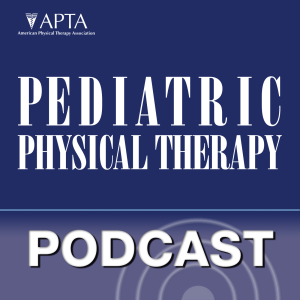
Therapy use for children with developmental conditions: Analysis of Colorado Medicaid data
Interview with Beth M. McManus
(Co-authors: Mary Jane Rapport, Zachary Richardson, and Richard Lindrooth)
DESCRIPTION:
Infants and toddlers with cerebral palsy received lower doses of early intervention physical therapy than children who had developmental delay with comorbidities in a study of 20 000 Medicaid cases in Colorado. Beth McManus reports on the unmet need of less-easily noticed children who have disability and yet whose needs of physical therapy and potential benefit from it may be great.
Goal Attainment Scales to evaluate intervention of individual gains for children born extremely preterm
Interview with Laura Brown
(Co-authors: Yvonne Burns, Pauline Watter and Peter Gray)
DESCRIPTION:
Goal attainment scoring, or GAS, was shown to be a highly accurate method of assessing the effectiveness of physical therapy intervention in a cohort of infants born extremely preterm studied by a group in Sydney Australia. Lead author Laura Brown said that GAS has clinical relevance and is a useful tool among this group of children. Reliability and Validity of the 50-Foot Walk Test for Idiopathic Toe Walking
Interview with Catie Christensen
(Co-authors: Amanda Haddad and Elizabeth Maus)
DESCRIPTION:
The “50 foot Walk Test” is a simple and accurate method of assessing children for the severity of idiopathic toe-walking that can be highly recommended to clinicians as reproducible, with ratings varying little from one clinician to another, says Catie Christensen from Nationwide Children’s Hospital in Columbus Ohio. Kinematic Gait Changes Following Serial Casting and Bracing to Treat Toe Walking in a Child with Autism: A Retrospective Case-Report
Interview with Marybeth Barkocy
(Co-authors: James Dexter, and Colleen Petranovich)
DESCRIPTION:
The patience and compassion that physical therapists harness are clear from the case of a remarkable cure for toe-walking in a child with severe autistic spectrum disorder who had a difficult home environment. Marybeth Barkocy from New Mexico talks about her case report in Pediatric Physical Therapy Journal. How Accurately Do Both Parents and Health Professionals Assess Overweight in Children?
(Special Communication)
Interview with Cynthia Brown Dodds
(Co-authors: Ickpyo Hong, Patty Coker-Bolt, Annie N. Simpson and Craig A. Velozo)
DESCRIPTION:
Parents often do not recognize when their child is overweight according to research published in Pediatric Physical Therapy journal. According to co-author Cynthia Brown Dodds physical therapists are excellently placed to step up to the plate and provide necessary guidance on physical activity and nutrition once the barrier of recognizing childhood obesity has been overcome.
Physical Therapy for a Child with Infantile Idiopathic Scoliosis and Motor Delay: Case Report
Interview with Rhea Hall
(co-author Mary Jane Rapport)
DESCIPTION:
Severe idiopathic scoliosis was corrected in a 10-month old infant sufficiently to remove the need for serial casting. Rhea Hall from the University of Colorado in Aurora discusses the scope physical therapist have for achieving benefit even in infants from creatively assessing potential tools available to the family in the home environment to be used for improving spinal curvature. A Progressive Running Program for an Adolescent with Cerebral Palsy: Case Report
Interview with Jessica Lewis
(Case report)
DESCRIPTION:
If you have cerebral palsy can you go out jogging? Well: Yes. So says physical therapist Jessica Lewis talking about her the case history she wrote in Pediatric Physical Therapy journal. A simple running program she undertook with an adolescent had a big pay-off.
view more
More Episodes
Volume 20, Issue 4 Winter
 2010-04-01
2010-04-01
 2010-04-01
2010-04-01
Volume 20, Issue 3 Fall
 2010-04-01
2010-04-01
 2010-04-01
2010-04-01
Volume 20, Issue 2 Summer
 2010-04-01
2010-04-01
 2010-04-01
2010-04-01
Volume 20, Issue 1 Spring
 2010-04-01
2010-04-01
 2010-04-01
2010-04-01
0123
Create your
podcast in
minutes
- Full-featured podcast site
- Unlimited storage and bandwidth
- Comprehensive podcast stats
- Distribute to Apple Podcasts, Spotify, and more
- Make money with your podcast
It is Free
- Privacy Policy
- Cookie Policy
- Terms of Use
- Consent Preferences
- Copyright © 2015-2024 Podbean.com





